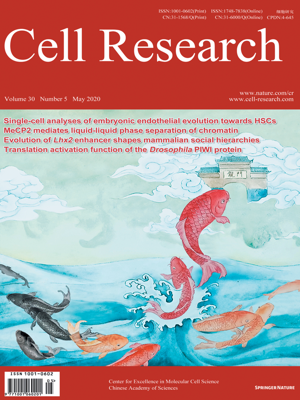
Volume 30, No 5, May 2020
ISSN: 1001-0602
EISSN: 1748-7838 2018
impact factor 17.848*
(Clarivate Analytics, 2019)
Volume 30 Issue 5, May 2020: 393-407
ORIGINAL ARTICLES
Rett syndrome-causing mutations compromise MeCP2-mediated liquid–liquid phase separation of chromatin
Liang Wang1, Mingli Hu 2,3, Mei-Qing Zuo4, Jicheng Zhao2, Di Wu 2,3, Li Huang2, Yongxin Wen5, Yunfan Li3, Ping Chen 2,6, Xinhua Bao5, Meng-Qiu Dong 4, Guohong Li 2,3 and Pilong Li 1
1 Beijing Advanced Innovation Center for Structural Biology, Beijing Frontier Research Center for Biological Structure, Tsinghua University-Peking University Joint Center for Life Sciences, School of Life Sciences, Tsinghua University, Beijing, China; 2National Laboratory of Biomacromolecules, CAS Center for Excellence in Biomacromolecules, Institute of Biophysics, Chinese Academy of Sciences, Beijing 100101, China; 3University of Chinese Academy of Sciences, Beijing, China; 4National Institute of Biological Sciences, Beijing,
China; 5Department of Pediatrics, Peking University First Hospital, Beijing, China and 6School of Basic Medical Sciences, Advanced Innovation Center for Human Brain Protection,
Capital Medical University, Beijing, China
Correspondence: Guohong Li (liguohong@sun5.ibp.ac.cn) or Pilong Li (pilongli@mail.tsinghua.edu.cn)These authors contributed equally: Liang Wang, Mingli Hu
Rett syndrome (RTT), a severe postnatal neurodevelopmental disorder, is caused by mutations in the X-linked gene encoding methyl-CpG-binding protein 2 (MeCP2). MeCP2 is a chromatin organizer regulating gene expression. RTT-causing mutations have been shown to affect this function. However, the mechanism by which MeCP2 organizes chromatin is unclear. In this study, we found that MeCP2 can induce compaction and liquid–liquid phase separation of nucleosomal arrays in vitro, and DNA methylation further enhances formation of chromatin condensates by MeCP2. Interestingly, RTT-causing mutations compromise MeCP2-mediated chromatin phase separation, while benign variants have little effect on this process. Moreover, MeCP2 competes with linker histone H1 to form mutually exclusive chromatin condensates in vitro and distinct heterochromatin foci in vivo. RTT-causing mutations reduce or even abolish the ability of MeCP2 to compete with histone H1 and to form chromatin condensates. Together, our results identify a novel mechanism by which phase separation underlies MeCP2-mediated heterochromatin formation and reveal the potential link between this process and the pathology of RTT.
Cell Research advance online publication 23 May 2006; doi: 10.1038/sj.cr.7310064
FULL TEXT | PDF
Browse 971


